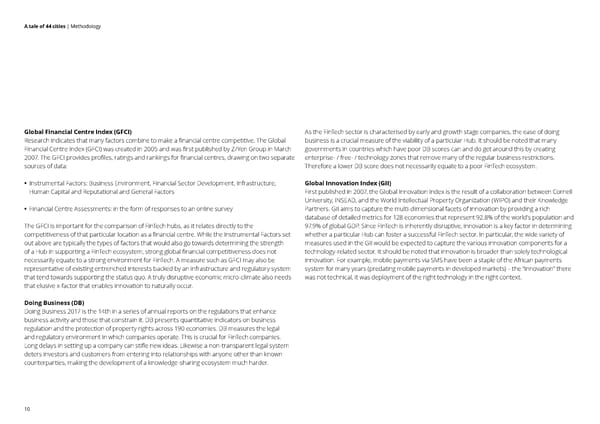A tale of 44 cities | Methodology Global Financial Centre Index (GFCI) As the FinTech sector is characterised by early and growth stage companies, the ease of doing Research indicates that many factors combine to make a financial centre competitive. The Global business is a crucial measure of the viability of a particular Hub. It should be noted that many Financial Centre Index (GFCI) was created in 2005 and was first published by Z/Yen Group in March governments in countries which have poor DB scores can and do get around this by creating 2007. The GFCI provides profiles, ratings and rankings for financial centres, drawing on two separate enterprise- / free- / technology-zones that remove many of the regular business restrictions. sources of data: Therefore a lower DB score does not necessarily equate to a poor FinTech ecosystem. • Instrumental Factors: Business Environment, Financial Sector Development, Infrastructure, Global Innovation Index (GII) Human Capital and Reputational and General Factors First published in 2007, the Global Innovation Index is the result of a collaboration between Cornell University, INSEAD, and the World Intellectual Property Organization (WIPO) and their Knowledge • Financial Centre Assessments: in the form of responses to an online survey Partners. GII aims to capture the multi-dimensional facets of innovation by providing a rich database of detailed metrics for 128 economies that represent 92.8% of the world’s population and The GFCI is important for the comparison of FinTech hubs, as it relates directly to the 97.9% of global GDP. Since FinTech is inherently disruptive, innovation is a key factor in determining competitiveness of that particular location as a financial centre. While the Instrumental Factors set whether a particular Hub can foster a successful FinTech sector. In particular, the wide variety of out above are typically the types of factors that would also go towards determining the strength measures used in the GII would be expected to capture the various innovation components for a of a Hub in supporting a FinTech ecosystem, strong global financial competitiveness does not technology-related sector. It should be noted that innovation is broader than solely technological necessarily equate to a strong environment for FinTech. A measure such as GFCI may also be innovation. For example, mobile payments via SMS have been a staple of the African payments representative of existing entrenched interests backed by an infrastructure and regulatory system system for many years (predating mobile payments in developed markets) – the “innovation” there that tend towards supporting the status quo. A truly disruptive economic micro-climate also needs was not technical, it was deployment of the right technology in the right context. that elusive x-factor that enables innovation to naturally occur. Doing Business (DB) Doing Business 2017 is the 14th in a series of annual reports on the regulations that enhance business activity and those that constrain it. DB presents quantitative indicators on business regulation and the protection of property rights across 190 economies. DB measures the legal and regulatory environment in which companies operate. This is crucial for FinTech companies. Long delays in setting up a company can stifle new ideas. Likewise a non-transparent legal system deters investors and customers from entering into relationships with anyone other than known counterparties, making the development of a knowledge-sharing ecosystem much harder. 10
 A Tale of 44 Cities Page 9 Page 11
A Tale of 44 Cities Page 9 Page 11